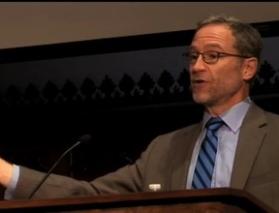Our lives are built around relationships. We have relationships with our parents, siblings, spouse, children, neighbors, co-workers, and many others. Among our different kinds of relationships in the world, there are two fundamental categories: our relationship with God, and our relationship with other human beings. These two different relationships define our life in this world, and both of these relationships work in very different ways.
Our relationship with God is a passive one. Before God, we do not work to establish our righteousness. We do not offer God any of our works, ideas, talents, or anything else in order to establish our relationship with Our Heavenly Father. Instead, God desires to be the one who works for us. He desires to give his gifts to us. This is why our righteousness before God is something that Jesus Christ earns for us, not something we do. God grants us righteousness freely, without demanding payment. We simply open up our hands of faith and receive all the Christ has to give.
The relationships that we have in the world work very differently. Instead of being passive, as those who merely receive, we are called to be active in the world. We are called to love and serve our neighbors. We are called to give all that we are to the world so that those in our communities have all that they need in this life. This is what we do in our jobs, and in our other vocations. Our jobs are opportunities for us to serve people, as are our roles in the family and in society.
Christians thus have two different kinds of righteousness. We have passive righteousness—that which God gives us freely through faith. This is something that we receive and don’t work for. On the other hand, we have active righteousness. We are not active for the good of God, because God doesn’t need our works! Instead, we are active in the world, because our neighbors need us. Our communities need us. Our families need us.
We need to make sure that we don’t confuse these two relationships, these two kinds of righteousness. This is what happened during Luther’s time. Many in the medieval church taught that God desires active righteousness from us in order to be saved. If we confuse these two types of righteousness, then we end up trusting in ourselves for our own salvation. We trust in ourselves and our activity to get us into heaven. But this is the opposite of the case! God does not judge us on our deeds, which will never be enough to stand before God’s judgment seat. Instead, God judges us on the righteousness of Jesus Christ alone. On the other hand, we will neglect our duties in this world if we confuse these two types of righteousness. If we think that passive righteousness establishes not only our relationship with God, but also our relationship with our neighbors, then we will end up neglecting the needs of the world around us. We will fail to do the work that God desires us to do out in the world. We will fail to work hard at our vocations.
When we go to the worship service, we need to see ourselves as those who receive. God desires to give us his forgiveness in absolution and the proclaimed Word. He desires to give us the true body and blood of his Son in Holy Communion. We simply receive, without any merit on our part. But then we must offer up our lives as a living sacrifice to God because of what he has done for us. We do this as we go out into the world during the week, as we go about our jobs and live with our families and neighbors.










